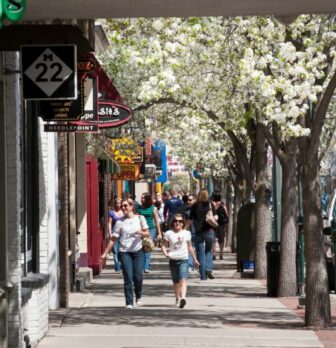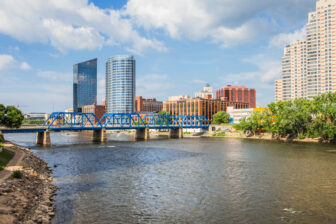At the same time that I was reading press reports that the powers that be have decided on bus rapid transit on Woodward from Detroit into Oakland County, Atlantic Cities ran an article on the success of the Phoenix light rail system. You read that right, no-real-downtown, sprawl-city Phoenix has made light rail a centerpiece to their regional economic growth strategy, and Detroit hasn’t. What is wrong with this picture?
The Phoenix light rail story is detailed in Alan Ehrenhalt’s The Great Inversion and the Future of the American City. Highly recommended! He writes: “In December 2008 Phoenix opened the light-rail transit system that Mayor Gordon and the business community had persuaded voters to approve by referendum earlier in the decade: a twenty mile, $1.4 billion Valley Metro train network.” The referendum approved a sales tax increase. And the region is now working on a more than six mile expansion of the already 20 mile rail system.
Phoenix and Arizona can hardly be written off as a high tax, wasteful government spending, anti-business costal city and state. The normal characterization of cities that have made a big investment in rail transit. And therefore, so the story goes, places metro Detroit shouldn’t use a model. In Phoenix, as Ehrenhalt describes, the light rail system and the tax increase that it required were anything but anti business. Business leadership was at the center of those who made the case for the centrality of rail transit to the region’s future success.
And Phoenix is not an outlier. Detroit is! Across the country –– in every region and in both red and blue states –– big metros have made rail transit a key component of their development strategy. The following is a list of metros with rail transit systems either operating or under construction. Some are on both lists. It comes from the Transport Politic. Worth checking out. I tried to edit the list and take out those who have a small center city only rail line, like the proposed M1 in Detroit and only list those who have a real regional rail system.
Its a long list. Sorry. But that is the point.
North American metros with heavy rail:
Atlanta | Baltimore | Boston | Chicago | Cleveland | Los Angeles | Miami | Montréal | New York | Philadelphia | San Francisco | Toronto | Vancouver | Washington
North American metros with light rail:
Austin | Baltimore | Boston | Calgary | Charlotte | Cleveland | Dallas | Denver | Edmonton | Houston | Hudson County (NJ) | Los Angeles | Minneapolis | Norfolk | Oceanside | Philadelphia | Phoenix | Pittsburgh | Portland | Sacramento | St. Louis | Salt Lake City | San Diego | San Francisco | San Jose | Seattle | Trenton
North American metros with rail transit under construction:
Atlanta | Calgary | Dallas | Denver | Edmonton | Honolulu | Houston | Los Angeles | Montréal | Minneapolis | New York City | Orlando | Philadelphia | Phoenix | Portland | Salt Lake City | San Francisco | Seattle | Toronto | Vancouver | Washington
These are the places that metro Detroit is going to compete with for both talent and business investment going forward. They all have and are making big public investments in regional rail transit systems. In nearly every case they have passed tax increases, with active business and political support from across the region, not just the central city.
Seems like its worth asking our state and regional business and political leadership why Detroit is not on this list. And why they think we can compete for talent and businesses without a regional rail transit system when their counterparts across the country think rail transit is a central ingredient to regional competitiveness.






